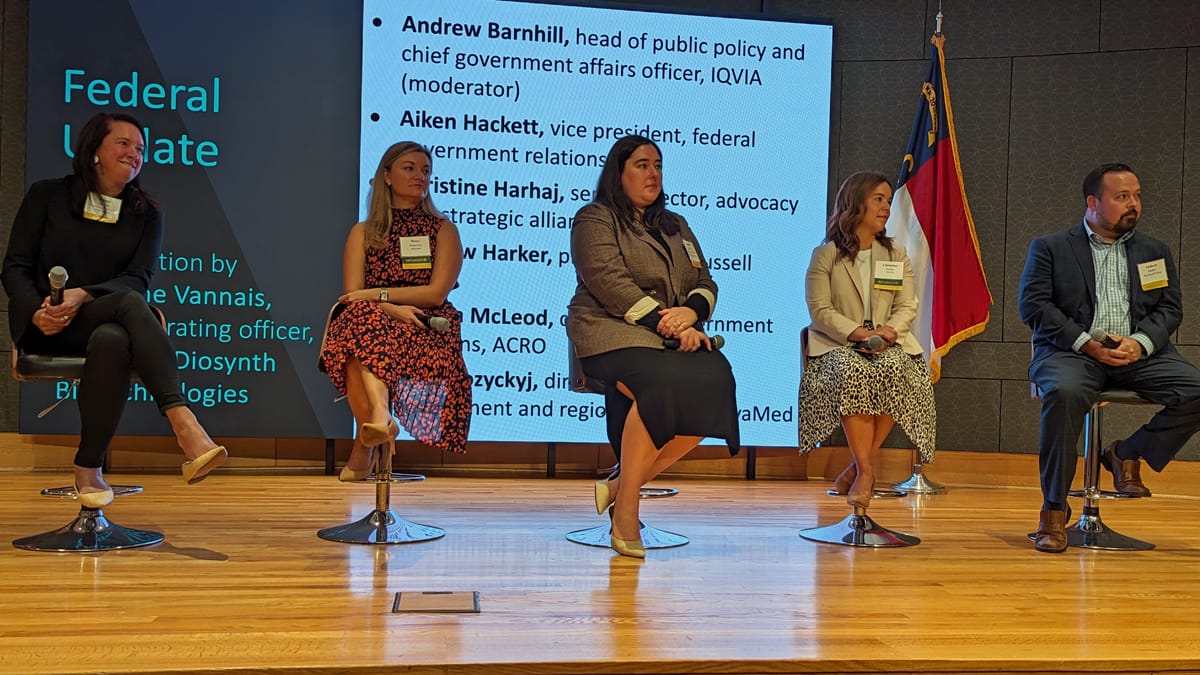NCLifeSci advocates for government policies that encourage innovation and growth in the life sciences industry so that it can thrive and continue to bring new improvements, treatments and cures to light.
Federal Advocacy
What we're watching in Congress in 2024
As the 118th Congress begins its second year, these are some of our top federal priorities for industry and patients in 2024.
- R&D amortization: As of 2022, R&D expenses must be amortized over five years, reducing the full deduction to 20% annually. With remedial legislation moving through Congress, BIO has launched a campaign to urge policymakers to reverse the change. See more details below.
- PBM reform: Acting as middlemen between drug makers, pharmacies, and insurers, pharmacy benefit managers exploit their market power to profit by driving up drug prices. Congress advanced PBM reform last year, with the House passing the Lower Cost, More Transparency Act by a bipartisan vote in December. (BIO’s taking action on PBMs, too.)
- The Inflation Reduction Act’s effect on orphan and small molecule drugs. The law disincentivizes the development of orphan drugs for rare diseases and small molecule drugs. The newly introduced EPIC Act aims to bring parity and move negotiation timelines for all new drugs out to 13 years.
- March-in rights: The Biden administration has taken the position that the cost of some drugs developed with federal funds limits their availability and gives the administration the right to "march in" and assign licenses to manufacture the drugs to third parties. The public comment period for this unorthodox interpretation of the Bayh-Dole Act ends Feb. 6.
- The ORPHAN Cures Act, making its way through Congress, would exempt orphan drugs from price controls even if they’re approved for multiple indications.
- The Pandemic and All Hazards Preparedness Act, which awaits reauthorization, will help us get ready for the next pandemic.
- The Farm Bill, which was renewed for one year but awaits the full five-year reauthorization, can support much needed agricultural biotech and biomanufacturing.
- Antimicrobial resistance: The PASTEUR Act would address market problems to encourage the development of antimicrobials.
- The Rare Pediatric Disease Priority Review Voucher Program needs funding to incentivize the development of novel therapies to treat pediatric diseases and spur investment to help the most vulnerable.
- Transitional Coverage for Emerging Technologies would create an alternative, expedited pathway to coverage and payment for emerging devices and diagnostics to improve on the average of five years it takes for medical technologies to achieve nationwide coding, coverage and payment.
- Ethylene oxide sterilization is one of the most common ways to sterilize medical devices. New EPA regulations proposed for the gas could force the closure of a number of sterilization industries, which the FDA says would be catastrophic for patients.
State Advocacy
NCLifeSci works closely with the NC General Assembly and its Life Sciences Caucus, as well as the Governor's Office and state agencies, to support and strengthen North Carolina's position and leadership as a national life sciences hub.
- The One NC Small Business Fund provides matching funds to NC companies that receive federal SBIR/STTR awards. In the last legislative session, the One NC fund was provided with recurring funds in the state budget, which are available year. NCLifeSci supports increased funding for the fund and favors allowing companies to receive matching fund for multiple SBIR/STTR awards.
- NCLifeSci will advocate for continued funding and support for the NC Biotechnology Center.
- Workforce development will continue to be a key focus with NCLifeSci supporting increased funding for community-college-based training programs and increased salaries for the highly qualified faculty needed to staff these programs.
- State infrastructure support, especially wastewater capacity and management, is becoming an area of increased focus for NCLifeSci. There is a lot of work to be done in this area. Initially, NCLifeSci is meeting with legislative branch, the executive branch and the Department of Environmental Quality to review immediate needs and long-term needs to begin to work toward possible solutions. One area is supporting the DEQ in filling the many staff vacancies it has, particularly among the engineers needed for the planning and permitting process.
- Franchise tax: NCLifeSci is working for the repeal or reduction of the franchise tax, a tax applied for the privilege of doing business in the state. The tax is solely based on net worth as the state has eliminated the calculations based on the value of real and tangible personal property or the taxpayer’s total actual investment in tangible personal property. NCLifeSci favors doing away with the tax altogether or at least reducing its effect on prerevenue companies.
- Qualified Business Venture Tax Credit.

